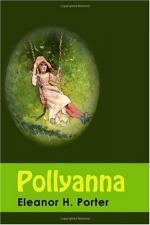“Well, maybe ’tis natural,” he sighed. “Of course things you don’t know about are always nicer’n things you do, same as the pertater on ’tother side of the plate is always the biggest. But I wish I looked that way ter somebody ’way off. Wouldn’t it be jest great, now, if only somebody over in India wanted me?”
Pollyanna clapped her hands.
“Why, of course! That’s the very thing, Jimmy! I’ll write to my Ladies’ Aiders about you. They aren’t over in India; they’re only out West—but that’s awful far away, just the same. I reckon you’d think so if you’d come all the way here as I did!”
Jimmy’s face brightened.
“Do you think they would—truly—take me?” he asked.
“Of course they would! Don’t they take little boys in India to bring up? Well, they can just play you are the little India boy this time. I reckon you’re far enough away to make a report, all right. You wait. I’ll write ’em. I’ll write Mrs. White. No, I’ll write Mrs. Jones. Mrs. White has got the most money, but Mrs. Jones gives the most—which is kind of funny, isn’t it?—when you think of it. But I reckon some of the Aiders will take you.”
“All right—but don’t furgit ter say I’ll work fur my board an’ keep,” put in Jimmy. “I ain’t no beggar, an’ biz’ness is biz’ness, even with Ladies’ Aiders, I’m thinkin’.” He hesitated, then added: “An’ I s’pose I better stay where I be fur a spell yet—till you hear.”
“Of course,” nodded Pollyanna emphatically. “Then I’ll know just where to find you. And they’ll take you—I’m sure you’re far enough away for that. Didn’t Aunt Polly take—Say!” she broke off, suddenly, “Do you suppose I was Aunt Polly’s little girl from India?”
“Well, if you ain’t the queerest kid,” grinned Jimmy, as he turned away.
It was about a week after the accident in Pendleton Woods that Pollyanna said to her aunt one morning:
“Aunt Polly, please would you mind very much if I took Mrs. Snow’s calf’s-foot jelly this week to some one else? I’m sure Mrs. Snow wouldn’t—this once.”
“Dear me, Pollyanna, what are you up to now?” sighed her aunt. “You are the most extraordinary child!”
Pollyanna frowned a little anxiously.
“Aunt Polly, please, what is extraordinary? If you’re EXtraordinary you can’t be ORdinary, can you?”
“You certainly can not.”
“Oh, that’s all right, then. I’m glad I’m EXtraordinary,” sighed Pollyanna, her face clearing. “You see, Mrs. White used to say Mrs. Rawson was a very ordinary woman—and she disliked Mrs. Rawson something awful. They were always fight—I mean, father had—that is, I mean, we had more trouble keeping peace between them than we did between any of the rest of the Aiders,” corrected Pollyanna, a little breathless from her efforts to steer between the Scylla of her father’s past commands in regard to speaking of church quarrels, and the Charybdis of her aunt’s present commands in regard to speaking of her father.




